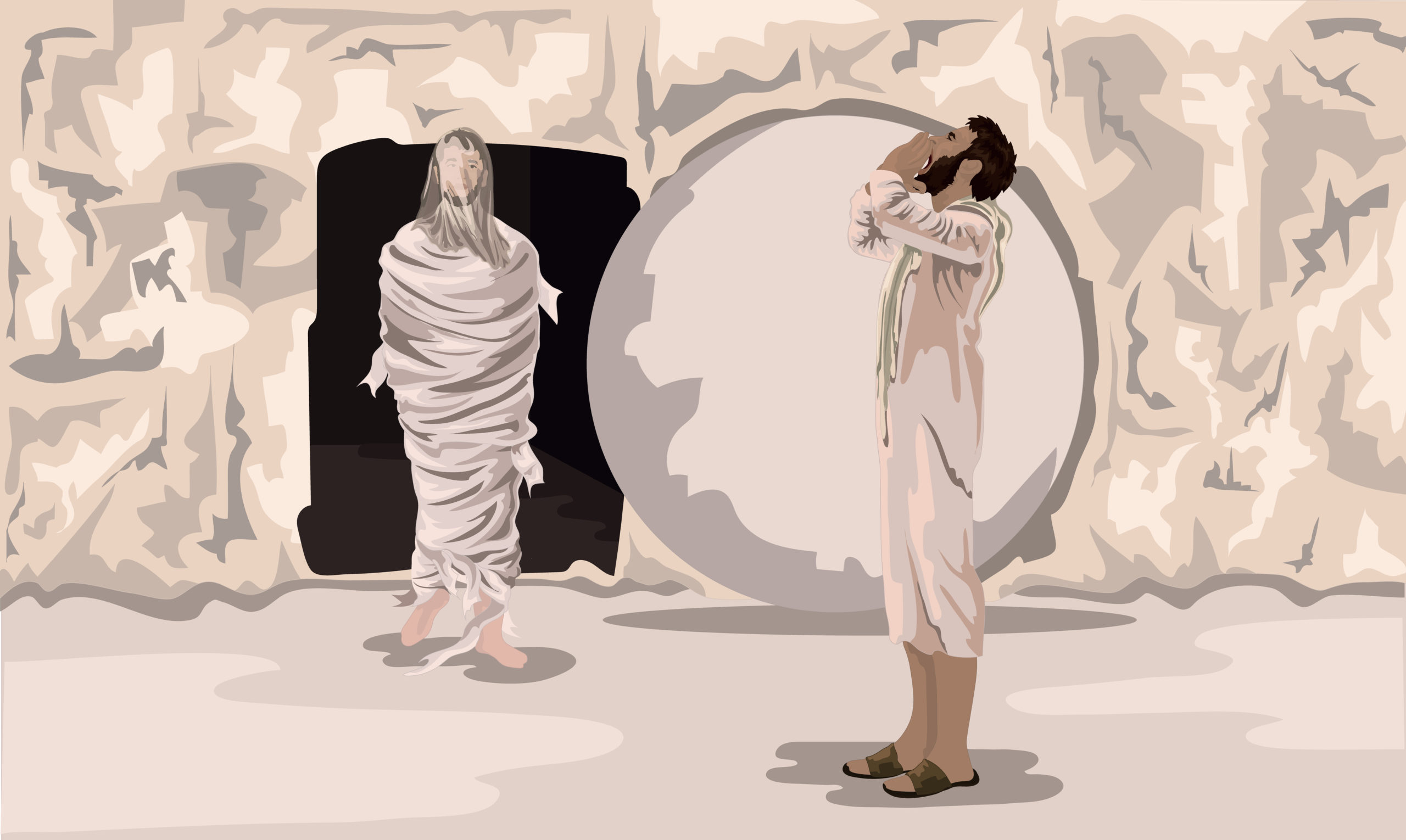This post is part of an ongoing series in the study of John we are doing during January. Subscribe to the blog for daily updates in the Bible Study posts. Subscribe to the podcasts to hear our discussion of the book of John throughout this month. Join us in your daily devotions as we travel through this fascinating account of the life of Christ.
***
Earlier in this blog series studying through the Gospel of John, we explained the frequent reference to “signs” throughout the Gospel of John. There are seven signs recorded in John’s Gospel. We have already seen six of these
- Turning the water into wine (John 2)
- Healing the official’s son (John 4)
- Healing the paralytic (John 5)
- Feeding the 5,000 (John 6)
- Walking on water (John 6)
- Healing the man born blind (John 9)
The seventh and final sign is the resurrection of Lazarus in John 11. All seven of these signs serve one primary focus.
Jesus performed many other signs in the presence of his disciples, which are not recorded in this book. But these are written that you may believe that Jesus is the Messiah, the Son of God, and that by believing you may have life in his name. John 20:30-31 (NIV)
We could study each of these signs to learn about Christ (a good study if you have not done so already). This final sign caps off this part of the gospel by emphatically and unquestioningly declaring Christ’s authority over life and death.
The Paradigm
When he heard this, Jesus said, “This sickness will not end in death. No, it is for God’s glory so that God’s Son may be glorified through it.” John 11:4 (NIV)
Jesus did not encounter the situations of life in the same manner that most of mankind does. A life governed by the perspective of this world becomes accustomed to the ebbs and flows, the good and the bad, of life. Because we cannot control life, we acclimate ourselves to this fact, and the unpredictability of life becomes predictable. This is a worldview governed by the boundaries of mortality.
Whatever is has already been, and what will be has been before; and God will call the past to account. Ecclesiastes 3:15 (NIV)
Ever since our ancestors died, everything goes on as it has since the beginning of creation.” 2 Peter 3:4 (NIV)
This is a reasonable approach to life, but it is not a Kingdom of God-based approach to life. Jesus saw the world and the ebbs and flows of life differently. He filtered everything through the grid of God’s will and God’s glory. The questions of God’s will and what will bring God glory dominated His reality and approach to the world. Everything else became subordinated to that.
When He and the disciples approached a blind man in chapter 9, the disciples saw an issue of sin and blindness, but Jesus saw a situation that would display the works of God (John 9:3). When they approached a fig tree with no fruit, the disciples paid it no mind (Matthew 21). It was not fruit-bearing season. But Jesus cursed the tree because it did not line up to the requirement of God. The seasons of this earth and the expectations of this world are irrelevant to the Kingdom of God. The only relevant things are the will of God and the glory of God. Even when His good friend Lazarus became sick and died – Jesus looked to the will and glory of God as His guide.
This worldview was in line with what He explained earlier in the gospel:
So Jesus explained, “I tell you the truth, the Son can do nothing by himself. He does only what he sees the Father doing. Whatever the Father does, the Son also does. John 5:19 (NLT)
It is worth considering that Jesus modeled this paradigm as a standard for us to live by and how much our lives would change if we truly embraced this perspective of life. What would our jobs, our families, our expectations, our ambitions, our plans, our whole life experience be like if the primary driver for it all became the will and glory of God?
The Groaning For More
Lazarus and his sisters Mary and Martha were not bad people. They were faithful followers and supporters of Jesus. His delay did not make sense to Mary and Martha. They had faith to believe he was capable of healing their brother Lazarus.
Now Martha said to Jesus, “Lord, if You had been here, my brother would not have died. John 11:21 (NKJV)
Then, when Mary came where Jesus was, and saw Him, she fell down at His feet, saying to Him, “Lord, if You had been here, my brother would not have died.” John 11:32 (NKJV)
Most likely, they had seen Jesus heal the sick previously, which fueled their faith. But when He delayed coming to them upon receiving the alert that Lazarus was deathly ill (John 11:3), they did not understand. When Lazarus died, the rules of mortality said it was too late for Jesus to do anything about it. They saw the end of hope, but Jesus still saw a situation ruled by the laws of God’s will and God’s glory.
Therefore, when Jesus saw her weeping, and the Jews who came with her weeping, He groaned in the spirit and was troubled. John 11:33 (NKJV)
Then Jesus, again groaning in Himself, came to the tomb. It was a cave, and a stone lay against it. John 11:38 (NKJV)
Twice in this passage, we find Jesus groaning. The word groaning here is probably a poor choice for the translators. The Greek word literally translates to “snort with anger” or to have indignation. Another translation states, “a deep anger welled up within Him” instead of using the word groaning. Elsewhere in the New Testament, we find the same word translated as “sternly warned” and “criticized sharply.”
The groaning demonstrated by Jesus here signifies a level of frustration and discontent at the atmosphere created by the mourning and sorrow in a household that was otherwise full of faith.
It is worth noting that shortly after this passage, Jesus is about to confront death personally. So His frustration may also be directed toward this chief enemy and ruler of the paradigms that dominate the realities of humanity. He seeks the will and glory of God, but the supreme power of death dominates everyone around Him.
When he directs them to roll away the stone that seals off the tomb of Lazarus, Martha objects:
Jesus said, “Take away the stone.” Martha, the sister of him who was dead, said to Him, “Lord, by this time there is a stench, for he has been dead four days.” John 11:39 (NKJV)
Lazarus has been dead for four days. In Jewish tradition, that was the fulfillment of death. The spirit lingered over the body for three days and then departed. There is no hope left. Death has won and rules here. For Martha, sister to the deceased, opening the tomb only means confronting the brutal, humbling reality of death. By this time, the stench of decomposition has set in. Why toy with death? There is nothing we can do about it. Death is the master in this world.
But again, that is not the rules that Jesus operated by. Death is not His master. The will and glory of God is His master.
Jesus said to her, “Did I not say to you that if you would believe you would see the glory of God?” John 11:40 (NKJV)
The Plot to Kill Jesus
The resurrection of Lazarus sets the stage for the ultimate confrontation for authority over this world. When He called Lazarus out of the tomb, Jesus demonstrated that no power in creation could control Him. Even death was subject to His command. This final sign shocked the people, but it also stunned the spirit realm. When He violated the power of death, Jesus violated what the forces of darkness relied upon to rule over this world.
The response of the religious leaders to the resurrection of Lazarus is irrational:
Then, from that day on, they plotted to put Him to death. Therefore Jesus no longer walked openly among the Jews, but went from there into the country near the wilderness, to a city called Ephraim, and there remained with His disciples. John 11:53-54 (NKJV)
It only makes sense when we realize that a war between good and evil, light and darkness, truth and deception is being waged here.
In launching the surprise attack upon the authority of death in this world when He raised Lazarus from the dead, Jesus effectively put the forces of darkness on red alert. The basis of the power and authority with which darkness ruled the earth was now threatened. The forces of darkness were no longer concerned with hiding behind a façade of legitimacy. Now it was a no holds barred effort to eliminate this threat to the powers of darkness in the earth.





What do you think?
Show comments / Leave a comment